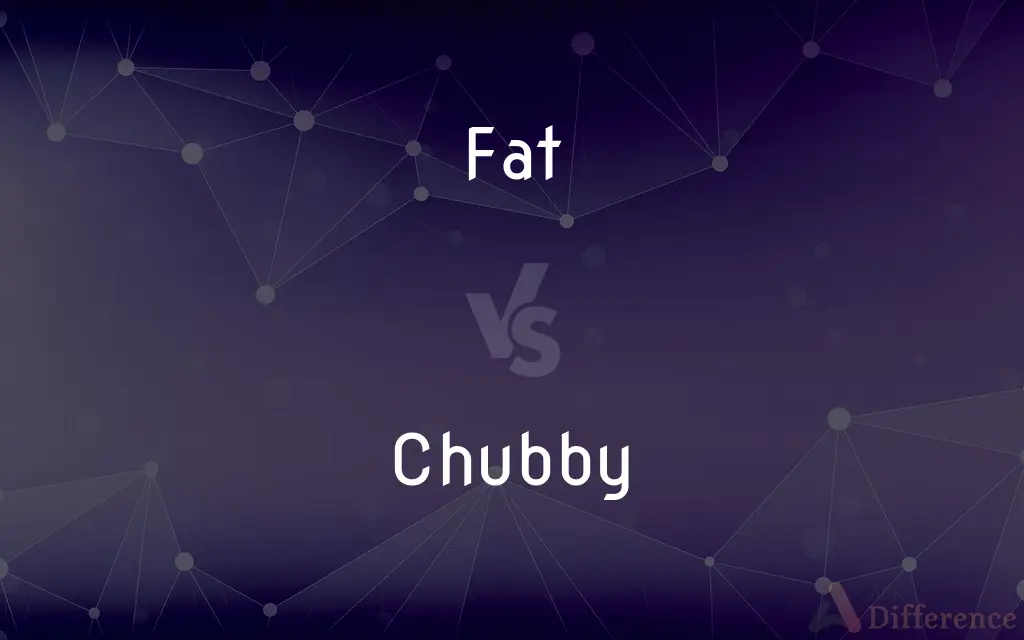It’s a question that has haunted many of us at some point in our lives: “Am I fat or am I chubby?” The words seem interchangeable, but they carry different connotations, sparking feelings of insecurity and self-doubt. Even though the lines between these terms are often blurred, understanding their nuanced meanings is crucial for embracing a healthy body image and navigating the complexities of societal perceptions.

Image:
Growing up, I vividly remember feeling self-conscious about my weight. The word “chubby” was used casually, and while I never thought of it as a cruel term, it still chipped away at my confidence. This lingering feeling of uncertainty is a testament to the power of language and the way society shapes our perceptions of our bodies.
Decoding Fat vs. Chubby: A Language Perspective
The truth is, “fat” and “chubby” are both descriptive terms, but they carry different emotional baggage. “Fat” is often seen as a negative and judgmental term, often associated with stigmatization and health concerns. On the other hand, “chubby” is frequently perceived as a more playful and less harsh descriptor, even if it still carries a sense of being overweight.
These varied perceptions highlight the complex relationship between language and body image. The way we talk about bodies, especially in terms of weight, can shape how we feel about ourselves and how we perceive others. It is important to be mindful of the words we use and strive for a more respectful and understanding approach to body diversity.
Beyond the Words: A Deeper Dive into Body Image
The debate about “fat” vs. “chubby” goes beyond simple definitions. It touches on a larger societal discourse about body acceptance, health, and beauty standards. The pressure to conform to an idealized body image can be incredibly damaging, leading to disordered eating, anxiety, and low self-esteem.
It’s crucial to remember that everyone’s body is unique and deserves respect. Focusing on health and well-being over arbitrary weight goals is a more sustainable and compassionate approach to personal well-being. Our focus should shift from labeling bodies to celebrating individual strengths and embracing diversity in all its forms.
The Impact of Language on Self-Perception
The words we use to describe our bodies and the bodies of others can have a profound impact on our self-perception. Using language that is respectful, accepting, and inclusive is crucial for fostering a positive body image and promoting a healthy relationship with ourselves and others.
Avoiding language that is derogatory or judgmental about body size is paramount. When addressing someone’s weight, it is always better to prioritize sensitivity and avoid labeling or making assumptions. For instance, instead of saying, “You’ve gotten so fat,” try using phrases like, “Have you been feeling a bit heavier lately?”

Image: www.askdifference.com
Empowering Language: Cultivating a Positive Body Image
Words have power. They can uplift or tear down. Embracing a positive body image means being mindful of the language we use and consciously choosing words that promote self-acceptance and respect.
Instead of dwelling on labels like “fat” or “chubby,” focus on the positive qualities that make you unique. Celebrate your strength, resilience, and the things that make you feel good about yourself. Remember that body size is just one aspect of who you are, and it does not define your worth.
The Importance of Diversity: Challenging Societal Norms
Body diversity is a vital aspect of human existence. We come in different shapes, sizes, and colors, and this diversity should be celebrated, not feared or ostracized. Challenging societal norms that equate thinness with beauty is a crucial step towards fostering a more inclusive and accepting world.
Media representation plays a significant role in shaping our perceptions of body image. It is important to seek out media that celebrates body diversity and promotes realistic beauty standards. Supporting projects that challenge unrealistic body ideals can help shift the cultural narrative and create a more representative and empowering environment.
Tips for Embracing Body Positivity
Here are some practical tips to cultivate a healthy and positive body image:
- Focus on your strengths. Instead of fixating on flaws, appreciate your unique qualities and talents.
- Practice self-compassion. Treat yourself with kindness and understanding, just like you would treat a loved one.
- Challenge negative thoughts. When negative thoughts about your body arise, challenge them with rational and positive self-affirmations.
- Surround yourself with positive influences. Seek out friends, family, and social media accounts that promote body positivity and self-acceptance.
- Celebrate your body. Engage in activities that make you feel good about your body, whether it’s dancing, hiking, or simply taking a relaxing bath.
Expert Advice: A Holistic Approach to Body Image
If you’re struggling with negative body image, seeking help from a qualified therapist or counselor can be incredibly empowering. They can provide guidance and support in navigating feelings of self-doubt and developing a healthier relationship with your body.
Remember, your body is a vessel for your soul. Treat it with respect, love, and compassion. Embrace the unique beauty and strength that you possess, and remember that you are perfectly perfect just the way you are.
FAQ: Fat vs. Chubby
Q: Is it okay to use the word “chubby” to describe a child?
A: While it may not be intended to be hurtful, the term “chubby” can still be perceived as a form of fat-shaming, especially as children develop their self-image. It’s generally best to avoid using such descriptive language and focus on emphasizing positive aspects of a child’s personality and growth.
Q: How can I avoid falling into the trap of body shaming others?
A: Be mindful of the language you use when describing someone’s body. Avoid making comments about their weight or appearance, as it can be hurtful and contribute to a negative body image. Instead, focus on their character, achievements, and other positive aspects.
Q: What are some common signs of a negative body image?
A: Some signs of a negative body image include:
- Constant self-criticism and negative self-talk
- Avoiding social situations where body image is a focus
- Feeling uncomfortable in your own skin
- Comparing yourself to others
- Obsessive focus on weight and diet
Q: Is there a difference between being healthy and being thin?
A: Health and weight are not directly correlated. There are people of all body sizes who are healthy, and there are people who are significantly overweight who are also healthy. Focus on maintaining a healthy lifestyle, including exercise, a balanced diet, and stress management, rather than fixating on a specific weight goal.
Fat Vs Chubby
Conclusion:
The terms “fat” and “chubby” are loaded with complex emotions and societal baggage. Ultimately, the way we perceive these words is shaped by our individual experiences and cultural influences. The key takeaway is to be mindful of the language we use and strive for a more compassionate and respectful approach to body diversity.
Remember, body image is a complex and personal journey. If you’re struggling with negative self-perception, don’t hesitate to seek support and guidance. You are not alone.
Are you interested in learning more about body positivity and self-acceptance?

:max_bytes(150000):strip_icc()/OrangeGloEverydayHardwoodFloorCleaner22oz-5a95a4dd04d1cf0037cbd59c.jpeg?w=740&resize=740,414&ssl=1)




